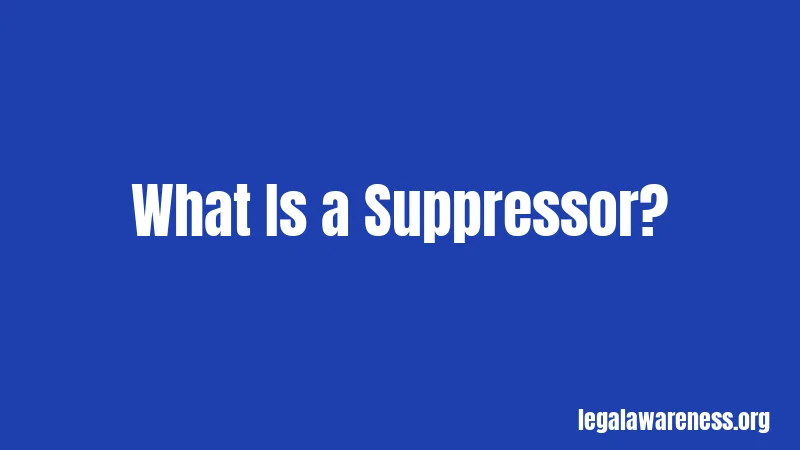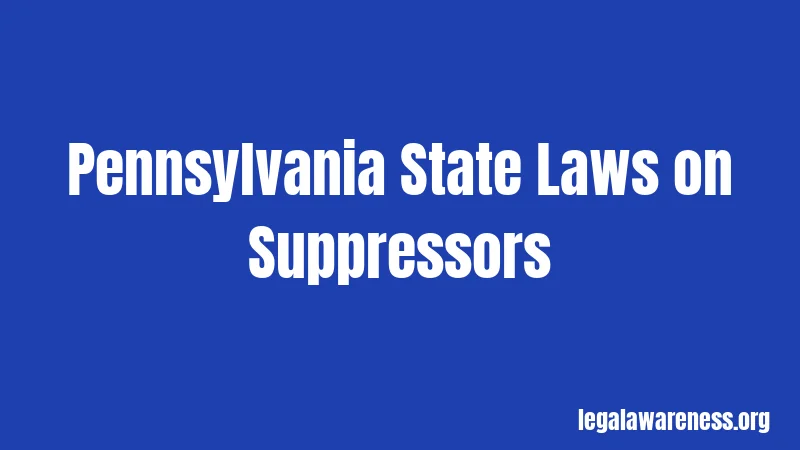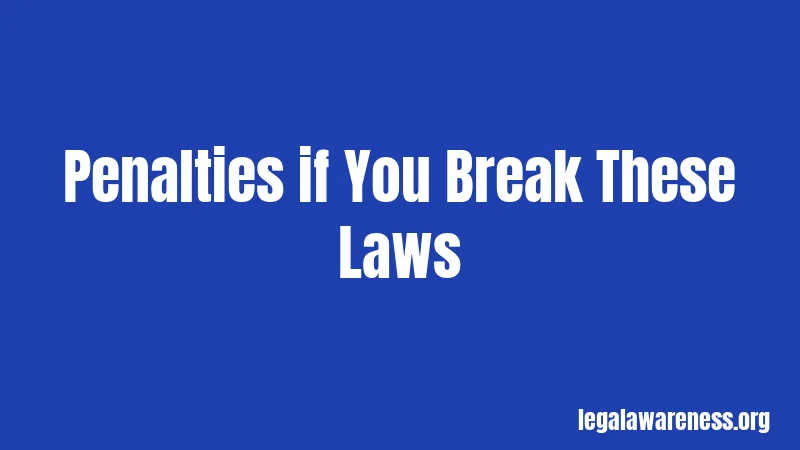Pennsylvania Suppressor Laws in 2026: What’s Actually Legal
Most people don’t realize that suppressor laws in Pennsylvania are pretty straightforward. But here’s the thing: a lot of gun owners still get confused about what’s actually allowed and what will get them in serious trouble. Let’s break down exactly what you need to know about suppressors in Pennsylvania.
What Is a Suppressor?

A suppressor (also called a silencer) is a device you attach to the end of a gun barrel. It reduces the noise when a gun fires. Think of it like a muffler on a car, but for firearms. Suppressors don’t make guns silent like in the movies. They just make them quieter.
Here’s what you should know: suppressors are heavily regulated at both the federal and state level. Pennsylvania has its own specific rules on top of federal laws. This means you need to follow Pennsylvania rules AND federal rules. Both matter.
Federal Suppressor Laws First
Before we dive into Pennsylvania’s laws, you need to understand federal regulations. Why? Because Pennsylvania allows suppressors, but the federal government is way stricter.
At the federal level, suppressors are regulated under the National Firearms Act (NFA). Basically, if you want a suppressor, you need to register it with the federal government. The process involves filling out forms, getting fingerprints, passing a background check, and paying a $200 tax stamp. Yep, that’s all you need to know: $200, background check, registration.
The wait time for federal approval takes several months, sometimes even longer. You can’t legally own or use a suppressor before your federal registration is approved. This is the biggest part of getting a suppressor legally.
Pennsylvania State Laws on Suppressors

Okay, here’s where it gets interesting. Pennsylvania’s state law is actually pretty clear on suppressors: they’re legal.
Pennsylvania doesn’t have a state-level ban on suppressors. You can legally own a suppressor in Pennsylvania as long as you follow federal law. That means if you have a federal tax stamp and your suppressor is registered with the ATF (the federal agency that handles this), you’re legal in Pennsylvania. Pretty straightforward, right?
But wait, there’s an important catch: you can’t use a suppressor for hunting in Pennsylvania. Seriously, that’s a specific rule. If you’re hunting in Pennsylvania, suppressors are off limits. The Pennsylvania Game Commission has strict rules about hunting equipment. Suppressors aren’t allowed for taking game animals.
That means you can own a suppressor in Pennsylvania. You just can’t use it while hunting. This confuses a lot of people, honestly.
Basic Suppressor Requirements in Pennsylvania
Let’s talk about what you actually need to do if you want to get a suppressor in Pennsylvania.
First, you need a federal tax stamp. This is non-negotiable. You submit your forms to the ATF, provide fingerprints, pass the background check, and wait. Once you’re approved, you get your tax stamp. After that, you can legally own the suppressor in Pennsylvania.
Second, you need to follow federal transport laws. Your suppressor has to be registered to you. If you travel with it, you need to keep your paperwork on you. Some states require you to transport suppressors in specific ways. Pennsylvania doesn’t have special transport rules beyond what federal law requires.
Third, remember that hunting rule. If you’re a hunter, your suppressor stays out of the woods during hunting season. This applies to all game animals in Pennsylvania.
Penalties if You Break These Laws

Sound complicated? It’s actually not once you know the basics.
Using a suppressor without federal registration is a federal crime. We’re talking serious consequences here. You could face up to 10 years in federal prison and fines up to $250,000. That’s not a slap on the wrist. This is way more serious than a regular criminal charge.
In Pennsylvania specifically, possessing an unregistered suppressor could also result in state weapons charges. Depending on the situation, you might face felony charges. Felonies mean potential prison time and permanent criminal records. Your gun rights could be revoked.
If you use a suppressor while hunting in Pennsylvania, you’re violating Game Commission rules. This can result in fines, loss of hunting privileges, and potentially weapons charges. The hunting violation itself might cost you $500 to $1,000 in fines and loss of your hunting license.
Here’s where it gets serious: if you’re caught with an unregistered suppressor, prosecutors might charge you with other federal weapons crimes too. Things can escalate quickly. Don’t mess around with this.
Federal vs. Pennsylvania Rules
This is where a lot of people get confused. Pennsylvania allows suppressors, but the federal government regulates them heavily. You need to meet both sets of requirements.
Think of it like this: Pennsylvania says yes to suppressors. But the federal government says yes, BUT you need registration, approval, and a tax stamp. The more restrictive law wins. In this case, you have to follow federal rules even though Pennsylvania allows them.
The good news is that if you follow federal law, you’re automatically legal in Pennsylvania. The bad news is that federal law is complicated and takes time. There’s no shortcut.
Special Circumstances and Exceptions
Okay, pause. Read this carefully.
Law enforcement officers and military personnel have different rules. If you’re in law enforcement or the military, some regulations might not apply to you the same way. But honestly, your agency will explain your specific rules. Don’t assume you’re exempt just because you wear a badge or uniform.
Hearing protection is actually a big reason people want suppressors. Many states now recognize that suppressors protect hearing. Pennsylvania hasn’t specifically legalized them for hearing protection in the way some states have. But if you legally own a suppressor through federal registration, using it in Pennsylvania is legal outside of hunting contexts.
Some people ask about suppressors for air rifles or pellet guns. These aren’t considered firearms under federal law, so different rules apply. But this gets into a gray area. If you’re curious about non-firearm options, talk to a lawyer or your local police department.
How to Legally Get a Suppressor in Pennsylvania
Here’s what you actually need to do if you want to own a suppressor legally.
Step One: Find a Dealer You need to buy your suppressor from a licensed firearms dealer (FFL). Not all dealers sell suppressors, so call around. Ask specifically if they handle NFA items. They’ll know what you’re talking about.
Step Two: Complete ATF Forms Your dealer will help you fill out Form 4 (for purchasing an NFA item). You’ll need to provide personal information, fingerprints, and a passport-style photo. This isn’t complicated, just detailed.
Step Three: Pay the Tax Stamp You’ll pay the $200 federal excise tax. Your dealer can usually collect this when you purchase, but check with them. This money goes to the federal government, not the dealer.
Step Four: Get Fingerprints You’ll need to get fingerprinted. Your local police department or a private fingerprinting service can do this. Bring the fingerprint cards your dealer gives you. This process takes maybe an hour.
Step Five: Wait for Approval The ATF will process your application. This takes anywhere from a few months to over a year, depending on how busy they are. You can’t take possession of your suppressor until you’re approved. Your dealer will hold it for you.
Step Six: Receive Your Tax Stamp Once approved, you’ll get an official tax stamp. You must keep this with your suppressor. If you travel, bring your paperwork.
That’s it. Six steps, and you’re legal. The hardest part is waiting.
Traveling With Your Suppressor
Not sure what counts as a violation when traveling? Let me break it down.
If you want to travel across state lines with your suppressor, things get complicated fast. Some states allow suppressors. Others don’t. You can’t just take your suppressor anywhere.
Pennsylvania to a neighboring state? Check that state’s laws first. Just because it’s legal in Pennsylvania doesn’t mean it’s legal in Ohio, New York, or New Jersey. In fact, some of Pennsylvania’s neighbors have strict suppressor bans.
When you travel with a suppressor in Pennsylvania, keep your federal paperwork with you. Your tax stamp and registration documents are your proof of legal ownership. If a police officer stops you, show them your paperwork.
For federal travel rules, don’t transport your suppressor across state lines unless you’re absolutely sure the destination state allows it. The safest option? Keep your suppressor at home when you travel to other states. It’s not worth the legal risk.
Understanding the Hunting Ban
Wondering why Pennsylvania bans suppressors for hunting? There are actually good reasons.
The Game Commission wants to be able to hear gunshots while enforcing hunting laws. If hunters use suppressors, wildlife officers can’t easily locate illegal hunters or respond to violations. That’s the main reason for the ban.
Also, many hunters and conservationists worry that suppressors could increase poaching. If poachers can’t be heard, it’s harder to catch them. This is actually a valid concern in wildlife management.
The bottom line: you can own and possess a suppressor in Pennsylvania. You just can’t use it for hunting. Use it at a shooting range, at a gun club, or on private land for target shooting. Just not while hunting game animals.
Frequently Asked Questions
Can I legally own a suppressor in Pennsylvania? Yes, as long as you have a federal tax stamp and your suppressor is registered with the ATF. Pennsylvania itself doesn’t ban suppressors.
How much does a suppressor cost in total? The suppressor itself typically costs $400 to $1,000 depending on quality and type. Add the $200 federal tax stamp. Total cost is usually $600 to $1,200, plus wait times.
Can I use a suppressor at a shooting range in Pennsylvania? Yes, absolutely. Pennsylvania ranges and gun clubs allow suppressors as long as they’re federally registered. Many ranges actually have ranges specifically for NFA items.
What happens if I get caught with an unregistered suppressor? You could face federal felony charges, up to 10 years in prison, and $250,000 in fines. State charges could add more penalties. This is serious.
Do I need permission from Pennsylvania to own a suppressor? No, Pennsylvania doesn’t require special permission. You only need federal approval from the ATF. Once you have your tax stamp, you’re legal in Pennsylvania.
Can I sell my suppressor to someone else? Yes, but they need to register it with the ATF too. You can’t just hand it over to a friend. The new owner needs to go through the federal registration process and get their own tax stamp. The transfer process is similar to the original purchase.
Final Thoughts
Okay, here’s what you need to remember. Pennsylvania allows suppressors, which is great. But the federal government heavily regulates them. Get a federal tax stamp, register your suppressor with the ATF, and follow the process. Don’t use it for hunting. Keep your paperwork with you.
Most importantly, don’t try to own a suppressor without going through proper channels. The legal consequences are severe. Trust me, it’s not worth it.
Now you know the basics. Stay informed, stay legal, and when in doubt, ask a lawyer who specializes in gun law. They can answer specific questions about your situation. Stay safe out there.
References
Federal Bureau of Alcohol, Tobacco, Firearms and Explosives (ATF) NFA Information
Pennsylvania Game Commission Hunting Regulations
ATF Form 4 (Application to Make or Transfer a National Firearms Act Firearm)
